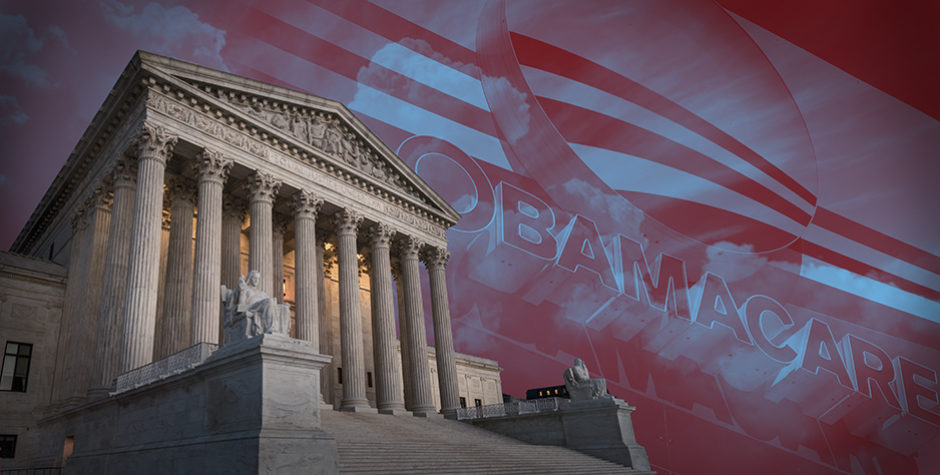ACLJ Files Amicus Brief Urging Supreme Court to Strike Down Key Portions of ObamaCare
Last week, the American Center for Law and Justice (ACLJ) filed an amicus brief with the Supreme Court of the United States, urging the Court to affirm a Fifth Circuit decision holding the individual mandate unconstitutional. As you probably remember, the individual mandate required millions of Americans to buy and indefinitely maintain health insurance or face annual penalties.
The ACLJ had been involved in several challenges to the individual mandate after ObamaCare was initially enacted, either representing parties or filing amicus briefs. We filed a critical amicus brief with the Supreme Court of the United States on behalf of 119 Members of Congress in 2012, and the Court agreed with us that the Commerce Clause of the Constitution did not authorize Congress to compel Americans to buy health insurance they did not want. But, according to the Court, the individual mandate could be upheld as a constitutional exercise of Congress’s power to tax because the law imposed a tax penalty on people who did not purchase health insurance. The Court’s decision to label the penalty a tax was surprising for many legal reasons, but also because Congress repeatedly assured Americans that ObamaCare would result in no new taxes.
Then in 2017, Congress passed the Tax Cuts and Jobs Act which, among many other things, eliminated the penalty for not purchasing health insurance. Beginning in 2019, Americans no longer had to pay any tax for not complying with the individual mandate. That was good news for those who had previously chosen to pay the penalty rather than buy expensive insurance they didn’t need. But now the only reason that the individual mandate was constitutional was gone. It remained as a bare command to buy insurance, and Congress does not have the power to issue such a bare command.
So sixteen states and two individual citizens sued in federal court, asking that the individual mandate be held unconstitutional. Both the district court and the Court of Appeals for the Fifth Circuit agreed. But the district court held further that the individual mandate was not “severable” from the rest of ObamaCare. What that meant was that all of ObamaCare should be struck down because Congress never intended the Act to function without the individual mandate.
The Fifth Circuit disagreed, however, about what the individual mandate’s unconstitutionality meant for the rest of the statute. But instead of reaching its own conclusions about the issue, the Fifth Circuit sent the case back to the district court for a do-over. Essentially, the Fifth Circuit instructed the district court to conduct a more thorough analysis of what should be done with the remaining provisions of ObamaCare.
At that point, however, the Intervenor Defendants, which included 19 liberal states, asked the Supreme Court to step in and grant review. Right before the Coronavirus pandemic hit the nation on March 2, the Supreme Court granted review.
The brief we filed with the Supreme Court addressed both the individual mandate and the remaining provisions of ObamaCare that should be struck down along with the individual mandate. With respect to the individual mandate, our brief argued:
All three features that supported the [Supreme] Court’s “saving construction” of the individual mandate as a tax are now effectively nonexistent. This year, Americans were no longer required to make the shared responsibility payment with their income tax returns and were therefore not responsible for calculating their payment in accordance with such “familiar factors as taxable income, number of dependents, and joint filing status.” Because no payments have been made, no revenue will be generated. . . . And because the mandatory requirement no longer triggers a tax payment generating revenue for the government, the individual mandate is unmoored from any of Congress’s enumerated powers.
With respect to the “severability” argument – whether other provisions of ObamaCare must also fall if the individual mandate is unconstitutional – we argued that ObamaCare’s text:
governs the severability issue and it establishes unequivocally that the individual mandate cannot be severed from at least the community rating and guaranteed issue provisions. The 2017 Congress neither repealed the individual mandate, nor rescinded the 2010 Congress’s Findings that the individual mandate was essential to the proper functioning of the guaranteed issue and community rating provisions. Because the ACA’s text is clear, it prevails over any inferences that might be drawn from Congress’s removal of the tax penalty.
The Court will hear oral argument next term – most likely after the presidential election. We will continue to monitor the case closely and be prepared to take further action if necessary.
